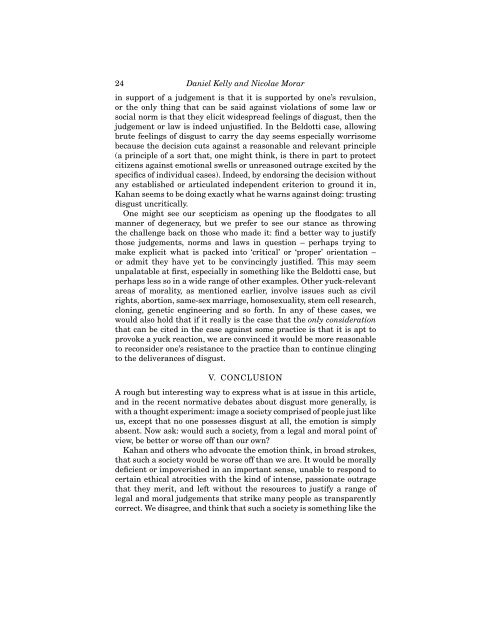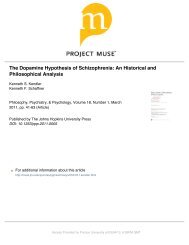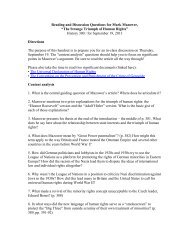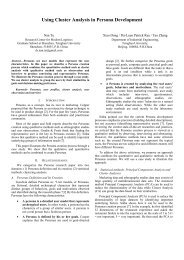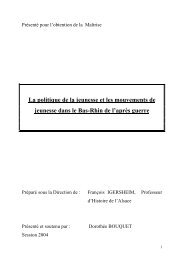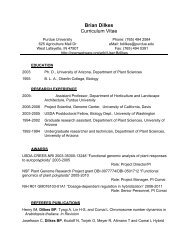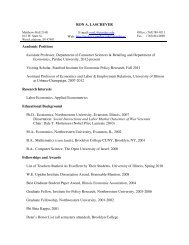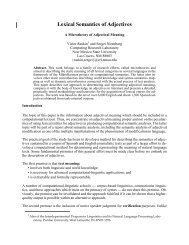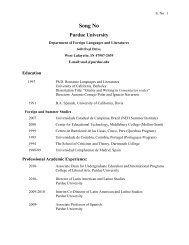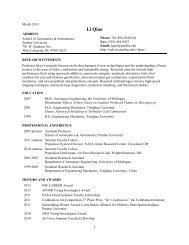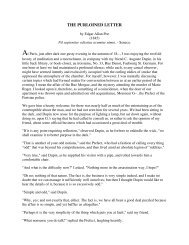Against the Yuck Factor - Career Account Web Pages - Purdue ...
Against the Yuck Factor - Career Account Web Pages - Purdue ...
Against the Yuck Factor - Career Account Web Pages - Purdue ...
Create successful ePaper yourself
Turn your PDF publications into a flip-book with our unique Google optimized e-Paper software.
24 Daniel Kelly and Nicolae Morar<br />
in support of a judgement is that it is supported by one’s revulsion,<br />
or <strong>the</strong> only thing that can be said against violations of some law or<br />
social norm is that <strong>the</strong>y elicit widespread feelings of disgust, <strong>the</strong>n <strong>the</strong><br />
judgement or law is indeed unjustified. In <strong>the</strong> Beldotti case, allowing<br />
brute feelings of disgust to carry <strong>the</strong> day seems especially worrisome<br />
because <strong>the</strong> decision cuts against a reasonable and relevant principle<br />
(a principle of a sort that, one might think, is <strong>the</strong>re in part to protect<br />
citizens against emotional swells or unreasoned outrage excited by <strong>the</strong><br />
specifics of individual cases). Indeed, by endorsing <strong>the</strong> decision without<br />
any established or articulated independent criterion to ground it in,<br />
Kahan seems to be doing exactly what he warns against doing: trusting<br />
disgust uncritically.<br />
One might see our scepticism as opening up <strong>the</strong> floodgates to all<br />
manner of degeneracy, but we prefer to see our stance as throwing<br />
<strong>the</strong> challenge back on those who made it: find a better way to justify<br />
those judgements, norms and laws in question – perhaps trying to<br />
make explicit what is packed into ‘critical’ or ‘proper’ orientation –<br />
or admit <strong>the</strong>y have yet to be convincingly justified. This may seem<br />
unpalatable at first, especially in something like <strong>the</strong> Beldotti case, but<br />
perhaps less so in a wide range of o<strong>the</strong>r examples. O<strong>the</strong>r yuck-relevant<br />
areas of morality, as mentioned earlier, involve issues such as civil<br />
rights, abortion, same-sex marriage, homosexuality, stem cell research,<br />
cloning, genetic engineering and so forth. In any of <strong>the</strong>se cases, we<br />
would also hold that if it really is <strong>the</strong> case that <strong>the</strong> only consideration<br />
that can be cited in <strong>the</strong> case against some practice is that it is apt to<br />
provoke a yuck reaction, we are convinced it would be more reasonable<br />
to reconsider one’s resistance to <strong>the</strong> practice than to continue clinging<br />
to <strong>the</strong> deliverances of disgust.<br />
V. CONCLUSION<br />
Aroughbutinterestingwaytoexpresswhatisatissueinthisarticle,<br />
and in <strong>the</strong> recent normative debates about disgust more generally, is<br />
with a thought experiment: image a society comprised of people just like<br />
us, except that no one possesses disgust at all, <strong>the</strong> emotion is simply<br />
absent. Now ask: would such a society, from a legal and moral point of<br />
view, be better or worse off than our own?<br />
Kahan and o<strong>the</strong>rs who advocate <strong>the</strong> emotion think, in broad strokes,<br />
that such a society would be worse off than we are. It would be morally<br />
deficient or impoverished in an important sense, unable to respond to<br />
certain ethical atrocities with <strong>the</strong> kind of intense, passionate outrage<br />
that <strong>the</strong>y merit, and left without <strong>the</strong> resources to justify a range of<br />
legal and moral judgements that strike many people as transparently<br />
correct. We disagree, and think that such a society is something like <strong>the</strong>


